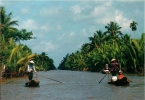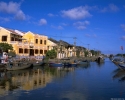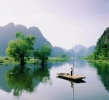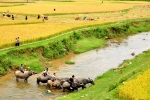
 Vietnam package tours
Vietnam package tours
 Hanoi tours
Hanoi tours
 Halong tours
Halong tours
 Halong cruises
Halong cruises
 Sapa tours
Sapa tours
 Ninh Binh tours
Ninh Binh tours
 Saigon tours
Saigon tours
 Mekong tours
Mekong tours
 Mekong cruises
Mekong cruises
 |
||
|
VIETNAM TRAVEL MAP
|
||
 |
 |
 |
||
 |
 |
Mekong travel
The Mekong Delta forms both the far southern region of
Vietnam and one of country's two main ricebowls. Dominated by the Mekong
River and its many tributaries, the surrounding lands are comprised of low
lying rice paddies and the rivers are bordered by dense mangroves and palms.
The tributaries of the hectic Mekong River highway provide a comprehensive
network of canals and channels.
Ho Chi Minh City Travel
Imagine a city where the exotic chic of old Asia blends with the dynamic face of new Asia. Where the medieval and modern co-exist. A city with a blend of Parisian grace and Asian pace, an architectural museum piece evolving in harmony with its history, rather than bulldozing through like many of the region’s capitals. Hanoi is where imagination becomes reality.
Hoian Travel
Ancient and peaceful, Hoi An is one of the most popular
destinations in Vietnam that caters to travellers of all tastes and across
the continents. The little town is just the perfect candidate of what
Vietnam tourism ministry is aiming to show to the world. Warm-hearted,
welcoming and traditional, but never out of touch with the outside world,
the people of Hoi An are in overdrive mode trying to catch up to the
opportunities their new found fame has recently given them.
Hue Travel
Located on the bank of Song Huong- Perfume River; Hue, the
capital of Thua Thien Hue province in Central Vietnam, is 700 km southern
Hanoi, 1100km northern Ho Chi Minh City, and only a few miles from the sea.
Not until 1945 was Hue the national capital, the political, cultural and
religious center of Vietnam under the control of Nguyen Dynasty.
Ninh Binh Travel
Ninh Binh is deep in the Red River Delta and characterized
by lotus flower lakes, towering limestone mountains, vast rice paddies and
evergreen untouched forests. Hoa Lu a district of Ninh Binh was the capital
city of Vietnam in the 10th century A.D. Cuc Phuong National Park of Ninh
Binh is among the best preserved national parks in Vietnam and was the
starting point of the legendary Ho Chi Minh Trails in the War.
Halong travel
Located in the North East of Vietnam in Quang Ninh
province, Halong bay with its clear emerald waters and 1969 limestone and
schist islands that come in all shapes and sizes is a spectacular creation
of nature.
The bay deserves its title as one of UNESCO’s World Heritage Site and is a must-visit to all tourists.
The bay deserves its title as one of UNESCO’s World Heritage Site and is a must-visit to all tourists.
Sapa Travel
At the height of 1, 600m above sea level, the average temperature of the area is 15-18°C. It is cool in summer and cold in winter.
Visitor to Sapa in summer can feel the climate of four seasons in one day. In the morning and afternoon, it is cool like the weather of spring and autumn. At noon, it is as sunny and cloudless as the weather of summer. And it is cold in the evening. With no advance warning of a thunderstorm short and heavy rains may come at noon on any summer day. Subsequently, a rainbow appears, transforming Sapa into a magic land, which for years has been a constant source of poetic inspiration, lights up the whole region.
Hanoi travel
Throughout the thousand years of its eventful history,
marked by destruction, wars and natural calamities, Hanoi still preserves
many ancient architectural works including the Old Quarter and over 600
pagodas and temples. Famous sites include the One Pillar Pagoda (built in
1049), the Temple of Literature (built in 1070), Hanoi Citadel, Hanoi Opera
House, President Ho Chi Minh's Mausoleum.
Related Travels
- Saigon city tour 1 day
- Ho Chi Minh city tour half day
- Vietnam tour package 10 days
- Vietnam package tour 14 days
- Vietnam tour package 17 days
- Vietnam tour package 21 days
- Vietnam package tour 25 days
- Vietnam package tour 29 days
- Halong bay tour 1 day
- Halong bay tour 2 days
- Vietnam package tour 10 days
- Vietnam package tour 14 days
- Vietnam package tour 17 days
- Vietnam package tour 21 days
- Northern vietnam tour 5 days
- North Vietnam package tour 5 days
- North Vietnam package tour 8 days
- Northern vietnam tour 8 days
- Northern Vietnam tour 11 days
- Saigon - Cu Chi tunnels tour 1 day












